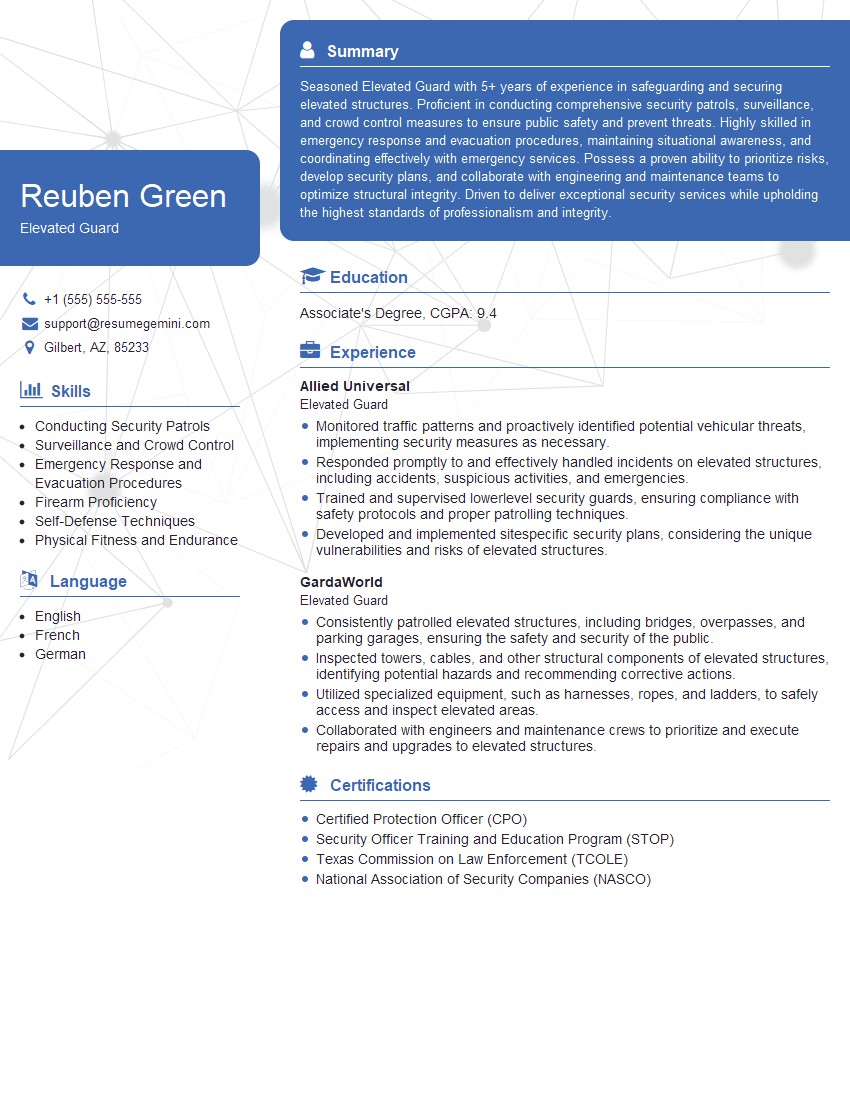Are you a seasoned Elevated Guard seeking a new career path? Discover our professionally built Elevated Guard Resume Template. This time-saving tool provides a solid foundation for your job search. Simply click “Edit Resume” to customize it with your unique experiences and achievements. Customize fonts and colors to match your personal style and increase your chances of landing your dream job. Explore more Resume Templates for additional options.

Reuben Green
Elevated Guard
Summary
Seasoned Elevated Guard with 5+ years of experience in safeguarding and securing elevated structures. Proficient in conducting comprehensive security patrols, surveillance, and crowd control measures to ensure public safety and prevent threats. Highly skilled in emergency response and evacuation procedures, maintaining situational awareness, and coordinating effectively with emergency services. Possess a proven ability to prioritize risks, develop security plans, and collaborate with engineering and maintenance teams to optimize structural integrity. Driven to deliver exceptional security services while upholding the highest standards of professionalism and integrity.
Education
Associate’s Degree
January 2018
Skills
- Conducting Security Patrols
- Surveillance and Crowd Control
- Emergency Response and Evacuation Procedures
- Firearm Proficiency
- Self-Defense Techniques
- Physical Fitness and Endurance
Work Experience
Elevated Guard
- Monitored traffic patterns and proactively identified potential vehicular threats, implementing security measures as necessary.
- Responded promptly to and effectively handled incidents on elevated structures, including accidents, suspicious activities, and emergencies.
- Trained and supervised lowerlevel security guards, ensuring compliance with safety protocols and proper patrolling techniques.
- Developed and implemented sitespecific security plans, considering the unique vulnerabilities and risks of elevated structures.
Elevated Guard
- Consistently patrolled elevated structures, including bridges, overpasses, and parking garages, ensuring the safety and security of the public.
- Inspected towers, cables, and other structural components of elevated structures, identifying potential hazards and recommending corrective actions.
- Utilized specialized equipment, such as harnesses, ropes, and ladders, to safely access and inspect elevated areas.
- Collaborated with engineers and maintenance crews to prioritize and execute repairs and upgrades to elevated structures.
Certificates
- Certified Protection Officer (CPO)
- Security Officer Training and Education Program (STOP)
- Texas Commission on Law Enforcement (TCOLE)
- National Association of Security Companies (NASCO)
Languages
- English
- French
- German
Career Expert Tips:
- Select the ideal resume template to showcase your professional experience effectively.
- Master the art of resume writing to highlight your unique qualifications and achievements.
- Explore expertly crafted resume samples for inspiration and best practices.
- Build your best resume for free this new year with ResumeGemini. Enjoy exclusive discounts on ATS optimized resume templates.
How To Write Resume For Elevated Guard
- Highlight your expertise in elevated structure security, emphasizing your knowledge of structural components and inspection procedures.
- Quantify your accomplishments, providing specific metrics and examples to demonstrate your impact on safety and security.
- Showcase your proficiency in using specialized equipment and your ability to work safely at heights.
- Emphasize your collaborative nature and experience working with engineers, maintenance crews, and emergency responders.
- Tailor your resume to each job application, highlighting the skills and experience most relevant to the specific elevated structure security role.
Essential Experience Highlights for a Strong Elevated Guard Resume
- Patrolled elevated structures (e.g., bridges, overpasses, parking garages) to safeguard public safety and prevent unauthorized access.
- Inspected infrastructure components (e.g., towers, cables, beams) to identify potential hazards and recommend corrective actions.
- Utilized specialized equipment (e.g., harnesses, ropes, ladders) to safely access and inspect hard-to-reach areas.
- Monitored traffic patterns and vehicular movements to identify and mitigate potential threats, including suspicious activities and traffic violations.
- Responded promptly to incidents on elevated structures, providing first aid, implementing crowd control measures, and assisting emergency responders.
- Developed and implemented security plans tailored to the unique vulnerabilities and risks of elevated structures.
- Supervised and trained lower-level security guards, ensuring compliance with protocols, proper patrolling techniques, and emergency procedures.
Frequently Asked Questions (FAQ’s) For Elevated Guard
What are the key qualities of an effective Elevated Guard?
Key qualities include a strong attention to detail, physical fitness, excellent communication and interpersonal skills, and the ability to work independently and as part of a team.
What are the different types of elevated structures that Elevated Guards typically secure?
Elevated Guards secure various elevated structures, including bridges, overpasses, parking garages, stadiums, and other high-traffic areas.
What are the common challenges faced by Elevated Guards?
Elevated Guards may face challenges such as working at heights, exposure to inclement weather conditions, and dealing with large crowds and traffic.
What are the career advancement opportunities for Elevated Guards?
Experienced Elevated Guards can advance to supervisory roles, such as Security Supervisor or Security Manager, or specialize in areas such as high-risk security or emergency response.
What are the physical requirements for becoming an Elevated Guard?
Elevated Guards must be in good physical condition, able to work at heights, and possess the strength and endurance to carry out their duties effectively.
What training and certifications are required for Elevated Guards?
Training and certifications may vary depending on the specific job role and company, but may include first aid, CPR, security procedures, and specialized training in working at heights.